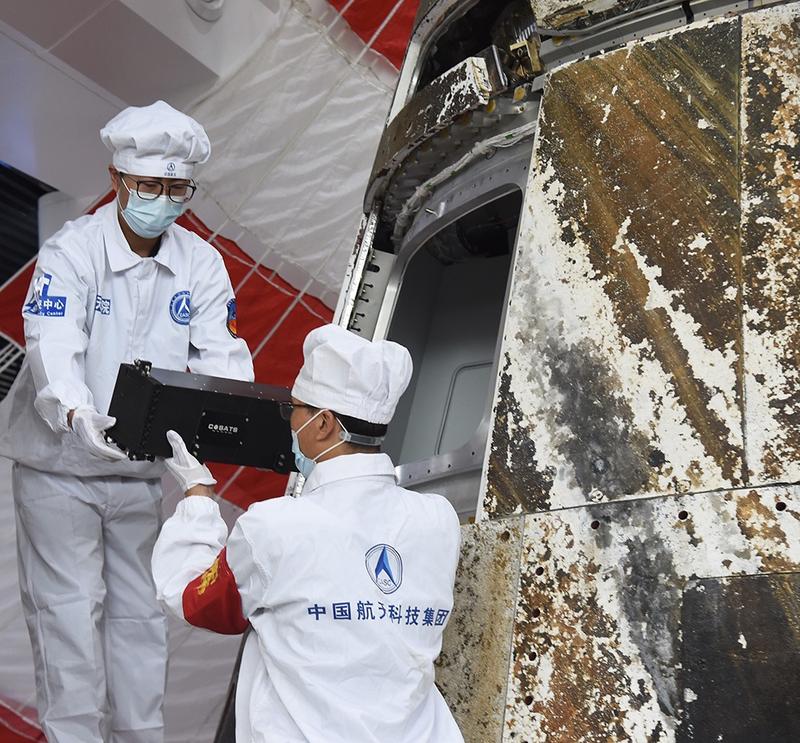 Workers retrieve space experiments from the re-entry module of China's new-generation manned spacecraft prototype during a ceremony in Beijing on May 29, 2022. (SU DONG / FOR CHINA DAILY)
Workers retrieve space experiments from the re-entry module of China's new-generation manned spacecraft prototype during a ceremony in Beijing on May 29, 2022. (SU DONG / FOR CHINA DAILY)
Chinese astronauts have successfully grown rice seedlings onboard the Tiangong space station and this experiment that may yield key insights into how astronauts can cultivate food to support long-term space missions, experts said on Monday.
While there have been other rice experiments in space, the one being conducted on Tiangong is the first of its kind that aims to produce the complete life cycle of the plant, which begins with a seed and ends with a mature plant producing new seeds.
China launched the Wentian space laboratory into orbit on July 24 to dock with the Chinese space station's Tianhe core module. The space lab, which weighs 23 metric tons and is 17.9 meters tall, is the country's largest and heaviest spacecraft to date. Onboard are eight experimental payloads, including the one for the rice experiment.
Zhao Liping, a researcher at the Technology and Engineering Center for Space Utilization of the Chinese Academy of Sciences, said the payloads are operating smoothly, and the three astronauts are conducting the experiments and testing them according to the plan.
Since the rice experiment began on July 29, the seedlings of the tall shoot rice variety have reached a height of about 30 centimeters, and the seedlings of the dwarf rice variety, dubbed Xiao Wei, grew to around 5 cm, said Zheng Huiqiong, a researcher at the Center for Excellence in Molecular Plant Sciences of the Chinese Academy of Sciences.
"The rice seedlings are growing very well," Zheng said, adding that the experiment also contained seedlings of Arabidopsis thaliana, a small flowering plant of the mustard family often used by scientists to study mutations.
The astronauts will keep monitoring the plants, and if the experiment is successful, they will collect the newly produced seeds and bring them back to Earth for further studies, she added.
"We want to investigate how microgravity can affect the plant flowering time on the molecular level and whether it is possible to use the microgravity environment to control the related process," she said. Flowering is a crucial stage for plant reproductive development.
Since the 1980s, China has been taking seeds of rice and other crops to space to help them mutate and produce higher yields once they were planted on Earth. But growing rice in orbit is a different challenge due to the harsh conditions of space such as microgravity, lack of air and high-energy cosmic rays.
Rice has been a staple food for astronauts since the early days of space exploration. US astronauts onboard the Apollo 11 mission, who were the first humans to land on the moon in July 1969, ate freeze-dried chicken and rice during their trip in space.
"But if we want to land on and explore Mars, bringing food from Earth is not enough to suffice for the astronauts' long journey and mission in space. We have to find a sustainable food source for long-term space explorations," Zheng said.


